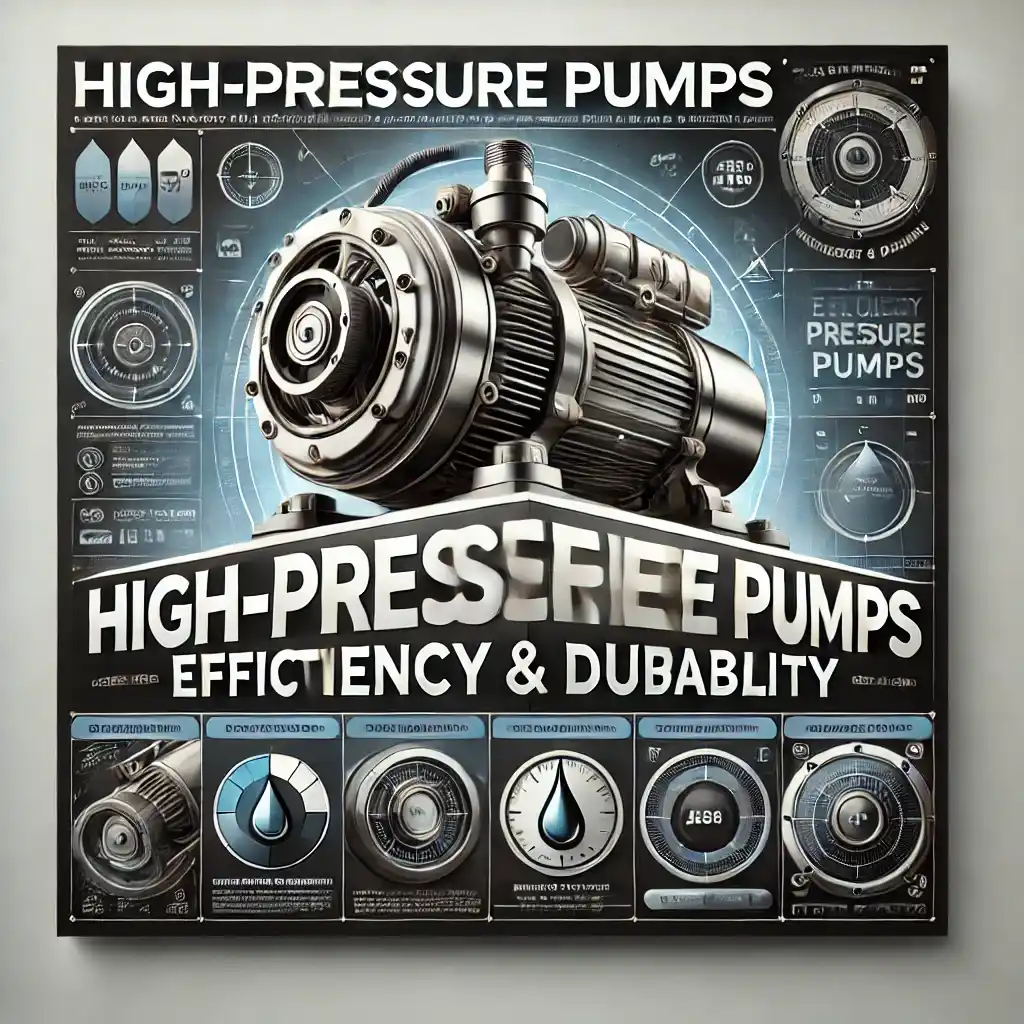

High Pressure Pump
High-pressure pumps have revolutionized industries and domestic applications by offering efficient and reliable solutions for water and fluid handling. From industrial processes to reverse osmosis systems, these pumps are the backbone of operations that demand high performance and durability. If you’re looking to understand the benefits, applications, and key features of high-pressure pumps, this blog provides a comprehensive guide.
What is a High-Pressure Pump?
A high-pressure pump is a device designed to move water or other fluids at elevated pressure levels. These pumps are widely used in various sectors, including:
-
Industrial Processes: For cooling, cleaning, and water jet applications.
-
Domestic Applications: Such as pressure boosting in residential water systems.
-
Reverse Osmosis (RO) Systems: Ensuring efficient water filtration and purification.
High-pressure pumps come in various types, including centrifugal, multistage, and diaphragm pumps, each catering to specific needs.
Benefits of Using High-Pressure Pumps
Investing in a high-pressure pump offers several advantages:
-
Energy Efficiency: Modern high-pressure pumps are designed to minimize energy consumption, making them cost-effective in the long run.
-
Durability and Reliability: Made from robust materials like stainless steel, these pumps withstand extreme conditions, ensuring long service life.
-
Enhanced Performance: High-pressure pumps deliver consistent flow rates and pressure, ideal for demanding tasks.
-
Versatility: From industrial plants to household applications, these pumps serve diverse needs with ease.
Key Features to Look for in a High-Pressure Pump
When choosing a high-pressure pump, consider these essential features:
-
Material: Stainless steel construction for corrosion resistance and durability.
-
Motor Efficiency: Look for pumps with high-efficiency motors, such as 3HP or 2HP options.
-
Flow Rate and Pressure: Ensure the pump meets your specific requirements for flow rate and pressure.
-
Compact Design: Space-saving designs are ideal for easy installation.
Examples of High-Pressure Pumps
Here are some examples of high-pressure pumps for different needs:
-
CRI Stainless Steel High Pressure Pump with 3HP Horsepower
-
A reliable option for various water handling applications.
-
-
IPCVM 2-11 Stainless Steel Multistage High Pressure Pump
-
Known for its efficiency in industrial processes.
-
-
IPCVM 2-9 Stainless Steel Multistage High Pressure Pump
-
Suitable for small-scale industrial applications.
-
-
IPCVM 2-7 Stainless Steel Multistage High Pressure Pump
-
A compact solution for medium-range pressure needs.
-
-
IPC 4-19 Vertical Multistage High Pressure Pump
-
Designed for heavy-duty industrial requirements.
-
Applications of High-Pressure Pumps
High-pressure pumps are versatile and indispensable in various fields. Some common applications include:
-
Industrial Cleaning: High-pressure pumps are used in industries to clean machinery, floors, and equipment.
-
Water Purification: Essential for reverse osmosis (RO) systems, ensuring clean and safe water.
-
Pressure Boosting: Enhances water pressure in residential and commercial buildings.
-
Agricultural Irrigation: Delivers water efficiently to crops, even in challenging terrains.
Why Choose Stainless Steel High-Pressure Pumps?
Stainless steel high-pressure pumps are a preferred choice due to their:
-
Corrosion Resistance: Ideal for handling water and chemicals, ensuring longevity.
-
Hygienic Properties: Suitable for applications in food processing and pharmaceuticals.
-
Aesthetic Appeal: Stainless steel pumps are not only durable but also visually appealing.
Tips for Maintaining High-Pressure Pumps
To ensure your high-pressure pump operates efficiently and lasts longer, follow these maintenance tips:
-
Regular Inspection: Check for wear and tear, and address issues promptly.
-
Clean the Pump: Remove debris and contaminants to prevent blockages.
-
Lubricate Moving Parts: Ensure smooth operation by lubricating parts as recommended.
-
Follow Manufacturer Guidelines: Adhere to the maintenance instructions provided by the manufacturer.
Optimizing High-Pressure Pumps for SEO
To make your blog SEO-friendly, keep these strategies in mind:
-
Keyword Placement: Use the keyword "high-pressure pump" naturally throughout the blog. Include it in headings, subheadings, and the meta description.
-
Internal and External Links: Add relevant links to high-pressure pump product pages.
-
Image Optimization: Use descriptive alt text for images showcasing high-pressure pumps.
-
Structured Content: Organize the blog into easy-to-read sections with bullet points and subheadings.
Conclusion
High-pressure pumps are indispensable for efficient water and fluid handling in various applications. Whether you need a pump for industrial RO systems or residential water boosting, choosing the right one can make a significant difference in performance and durability. Explore different models and understand your specific needs to make the most suitable choice.